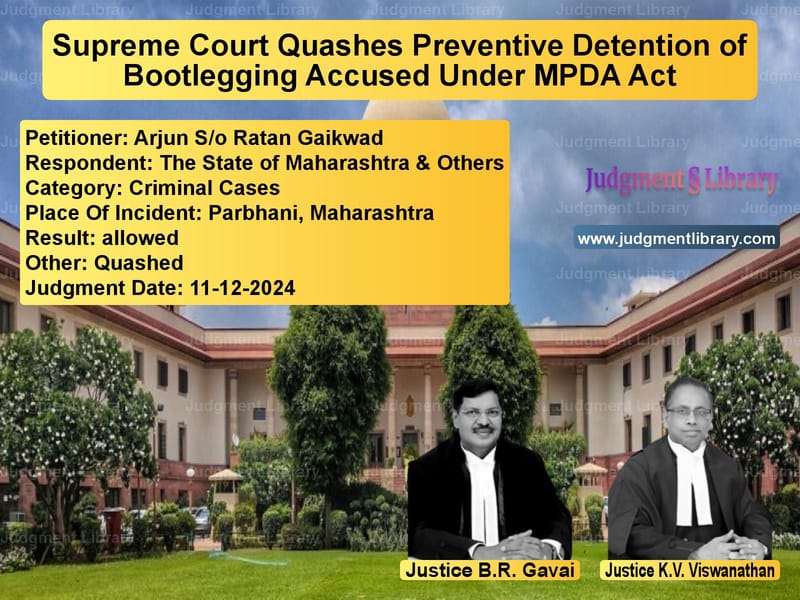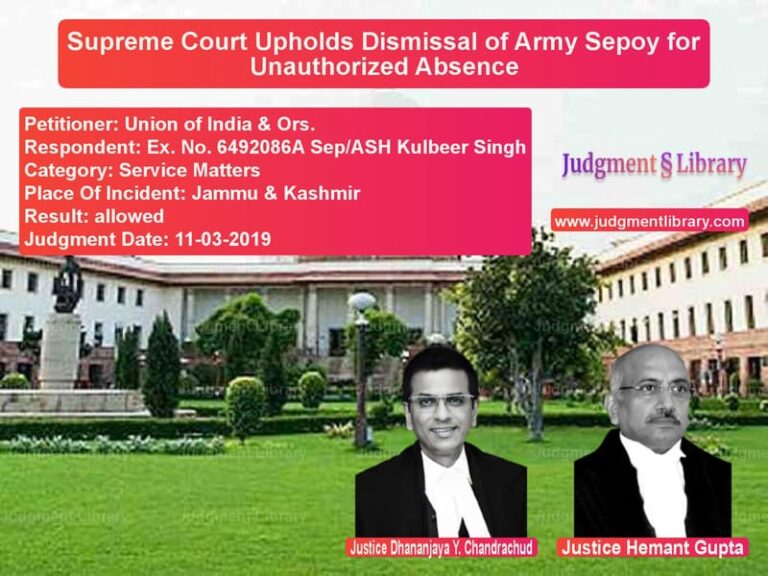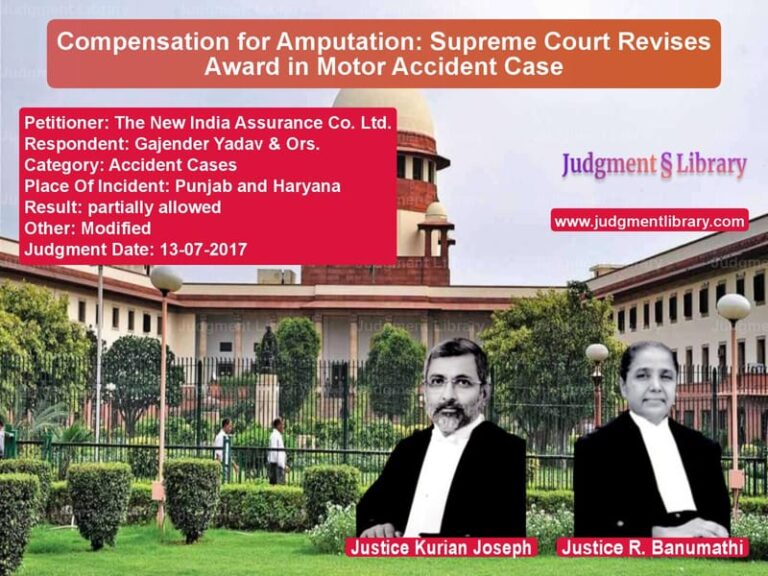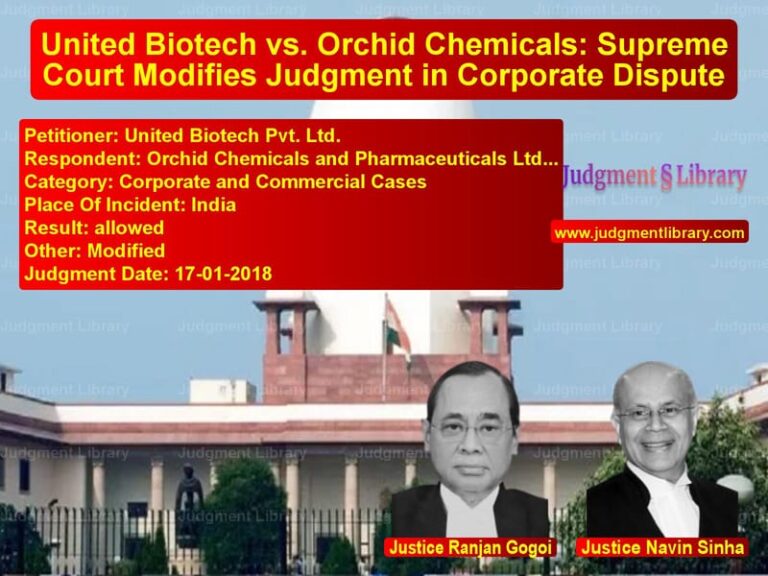Supreme Court Quashes Preventive Detention of Bootlegging Accused Under MPDA Act
The Supreme Court of India, in the case of Arjun S/o Ratan Gaikwad vs. The State of Maharashtra & Others, delivered a significant ruling on preventive detention under the Maharashtra Prevention of Dangerous Activities of Slumlords, Bootleggers, Drug-Offenders, Dangerous Persons, Video Pirates, Sand Smugglers, and Persons Engaged in Black-Marketing of Essential Commodities Act, 1981 (MPDA Act). The judgment, authored by B.R. Gavai and K.V. Viswanathan, quashed the detention order issued against the appellant and held that the alleged activities did not constitute a threat to public order.
Background of the Case
The appellant, Arjun S/o Ratan Gaikwad, was detained by the District Magistrate, Parbhani, under Section 3(2) of the MPDA Act for allegedly engaging in bootlegging activities that were deemed prejudicial to the maintenance of public order. The detention order was based on six cases registered against him by the State Excise Department over a span of one year.
The detention order was approved by the Home Department on March 14, 2024, and later confirmed by the Government of Maharashtra on May 8, 2024. The appellant challenged this order before the Bombay High Court, which dismissed his petition, prompting him to appeal to the Supreme Court.
Legal Issues Considered
- Did the appellant’s alleged activities justify preventive detention under the MPDA Act?
- Was there a nexus between the alleged offenses and the requirement to maintain public order?
- Was there procedural fairness in passing the detention order?
- Did the reliance on two unnamed witnesses substantiate the preventive detention?
Arguments by the Appellant
The appellant, represented by Senior Advocate Nachiketa Joshi, argued:
- The six cases cited by the detaining authority were related to illicit liquor trade and did not amount to a public order disturbance.
- There was a two-and-a-half-month delay between the proposal for detention and the actual order, which showed a lack of urgency.
- The appellant had not been arrested in any of these cases, indicating that his activities did not necessitate preventive detention.
- The detaining authority acted in a mechanical manner without assessing the real impact of the appellant’s alleged actions.
Arguments by the Respondent (State of Maharashtra)
The respondents, represented by Standing Counsel Siddharth Dharmadhikari, countered:
- The appellant’s bootlegging activities had caused serious harm to the local community, affecting law and order.
- Statements from two unnamed witnesses confirmed that the appellant had created an atmosphere of fear and terror in the locality.
- The detention order was passed to prevent the appellant from continuing illicit activities that could not be effectively tackled through regular law enforcement mechanisms.
Supreme Court’s Observations
On the Difference Between Public Order and Law and Order
The Court emphasized:
“Every breach of peace does not lead to public disorder. When two drunkards quarrel and fight, there is disorder but not public disorder. They can be dealt with under the powers to maintain law and order but cannot be detained on the ground that they were disturbing public order.”
It held that the concept of public order is distinct from law and order and applies only when an act affects the community at large.
On the Six Cases Cited Against the Appellant
The Court observed that all six cases were related to the illicit manufacture of liquor and spanned from January 2023 to October 2023. The Court noted:
“In none of these cases did the authorities find it necessary to arrest the appellant. This itself indicates that the alleged acts did not create a serious public order situation.”
On the Use of Anonymous Witness Statements
The detaining authority had relied on the statements of two unnamed witnesses. However, the Supreme Court found:
“The statements are identical in toto. There is no specific incident cited that shows how the appellant posed a continuous and serious threat to public order. Mere allegations of fear are insufficient.”
On the Procedural Fairness of the Detention Order
The Court criticized the delay in issuing the detention order and held:
“The time gap between the proposal for detention and the actual order indicates that the alleged acts did not create a situation of immediate threat.”
Final Verdict
The Supreme Court allowed the appeal and issued the following directives:
- The Bombay High Court’s order upholding the detention was quashed.
- The detention order dated March 5, 2024, and its confirmation order were set aside.
- The appellant was ordered to be released immediately if he was not required in any other case.
Impact of the Judgment
This ruling has significant legal and social implications:
- Limits misuse of preventive detention: Authorities cannot detain individuals unless their acts pose an imminent threat to public order.
- Upholds constitutional rights: Reinforces the principle that preventive detention should not replace regular law enforcement.
- Ensures procedural fairness: Mandates that detention orders must be based on clear and immediate necessity.
The judgment serves as a crucial precedent in defining the limits of preventive detention laws, ensuring they are not misused to suppress individual freedoms without adequate justification.
Petitioner Name: Arjun S/o Ratan Gaikwad.Respondent Name: The State of Maharashtra & Others.Judgment By: Justice B.R. Gavai, Justice K.V. Viswanathan.Place Of Incident: Parbhani, Maharashtra.Judgment Date: 11-12-2024.
Don’t miss out on the full details! Download the complete judgment in PDF format below and gain valuable insights instantly!
Download Judgment: arjun-so-ratan-gaik-vs-the-state-of-maharas-supreme-court-of-india-judgment-dated-11-12-2024.pdf
Directly Download Judgment: Directly download this Judgment
See all petitions in Bail and Anticipatory Bail
See all petitions in SC/ST Act Case
See all petitions in Custodial Deaths and Police Misconduct
See all petitions in Judgment by B R Gavai
See all petitions in Judgment by K.V. Viswanathan
See all petitions in allowed
See all petitions in Quashed
See all petitions in supreme court of India judgments December 2024
See all petitions in 2024 judgments
See all posts in Criminal Cases Category
See all allowed petitions in Criminal Cases Category
See all Dismissed petitions in Criminal Cases Category
See all partially allowed petitions in Criminal Cases Category







